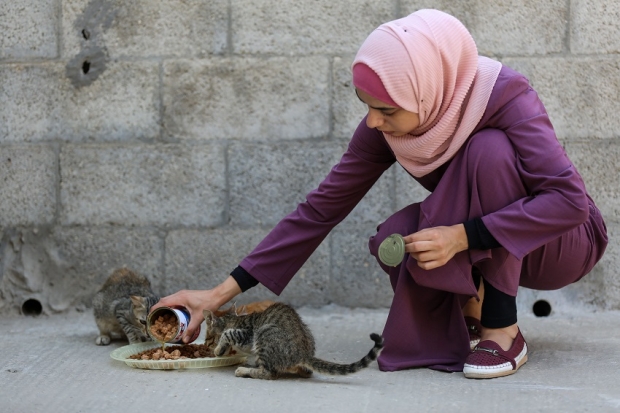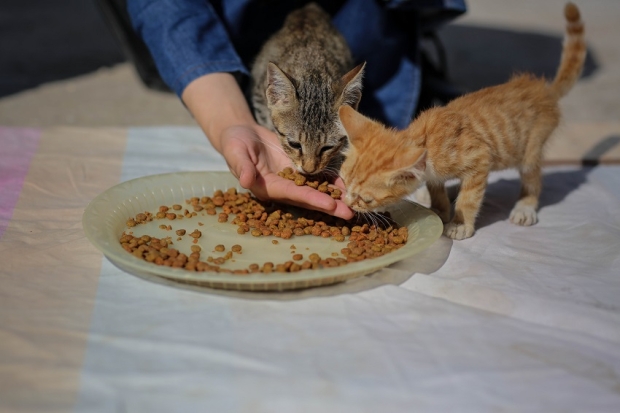Caring for Gaza's stray cats 'with all the money we had left'

GAZA STRIP – On a rooftop in the al-Shati refugee camp in northwestern Gaza city, three sisters are sitting among the 35 cats they rescued from the streets of Gaza.
Mariam, Raesa, and Elham al-Barr turned their three respective houses into cat shelters, caring for stray cats and small kittens from their neighbourhood by providing them with food and medical care.
Mariam, the youngest of the three sisters, still lives with her parents in the al-Zaitoun neighbourhood of eastern Gaza city. The 29-year-old is fostering eight cats she rescued.
Stay informed with MEE's newsletters
Sign up to get the latest alerts, insights and analysis, starting with Turkey Unpacked
"I cannot remember when we started [fostering strays] because cats have always been part of our family," Mariam tells MEE. "We were brought up in a house where our parents always helped and adopted stray cats, and we grew up to do the same thing."
My parents and sisters cannot afford to feed 35 cats every day, they can barely feed us
- Mariam al-Barr
Mariam, who studied at the Islamic University of Gaza to become a teacher, has not found a job yet. To keep busy, in her spare time she is taking courses in counselling and photography.
"Whenever I am going to the course and see a hungry or injured cat, I forget about the class and take it immediately to my house," she says.
On the pavement near her house, Mariam once found an injured cat that seemed to have been hit by a car. She took her to the vet and then brought her home to recover for one week before she could find a family to adopt her.
"We have a wide network of family members, friends and neighbours who sometimes call us and ask if we have cats for adoption. But we do not give any cat up for adoption until we make sure they will take good care of it,” she explains.
Raesa, 42, and Elham, 45, live in two separate small apartments in the same building. They keep some of the rescued cats in a space on the rooftop of the building. The rest live in their apartments where their children and spouses help take care of them.
Raesa teaches her five children to protect the neighbourhood cats from other residents who sometimes mistreat them, and encourages them to bring the cats home.
"I raise my children the way my parents raised me and my siblings: to be compassionate and help weak creatures," the 41-year-old housewife tells Middle East Eye. "When they go to sleep, all my children cuddle the cats they rescue instead of teddy bears."
Raesa's husband, Suhail Zohod, shares her passion and usually helps her feed, bathe and care for the cats.
When they go to sleep, all my children cuddle the cats they rescued instead of teddy bears
- Raesa al-Barr
"My husband has always supported and nurtured my passion for helping cats. He often brings me cats as gifts and treats our cats as if they were our children," she says. "A few months ago, he [adopted from a friend] a Persian kitten as a surprise gift for me because he knows I love them."
'Cats can starve'
According to Mariam, she and her sisters spend more than 400 Israeli shekels (around $111) a month on cat food.
Mariam's father and mother are unemployed, but the family owns the entire building where they live. In order to cover part of the family's basic needs, her father rents out the garage on the ground floor to his relatives.
I know I risked my life to feed the cats, but I had to do it and that was all that mattered
- Walid Afifi
Due to her family's poor economic condition, Mariam cuts down on transportation costs and other daily expenses so that she can buy cat food using her own pocket money.
"My parents and sisters cannot afford to feed 35 cats every day, they can barely feed us, so I sometimes choose to walk long distances rather than take a taxi to save some money to buy food for the cats," she says.
Raesa says she noticed that people started paying less attention to helping animals due to the severe economic crisis the Strip is facing.
Cats starve and get depressed just like humans. They just cannot communicate it to us
- Raesa al-Barr
According to the Euro-Mediterranean Human Rights Monitor, 38.8 percent of Gaza residents are stuck below the poverty line as a result of the Israeli blockade. A staggering 45 percent of people in Gaza are unemployed, while the unemployment rate is even higher among youth, reaching 60 percent.
In July 2017, the UN published a detailed report on Gaza, stating that the Strip had become "unliveable".
Both Raesa's and Elham's spouses work as tailors, and sometimes they get temporary employment opportunities funded by UNRWA, the UN relief agency for Palestinians, in small factories.
"With all the financial hardships Gazans are facing today, all they are concerned about now is how to feed their children and pay their bills and monthly rent," she explains.
But Raesa believes that the suffocating economy is no excuse to ignore the cats in dire need of help and shelter in Gaza.
"Someone who went through so many hardships and experienced what it is like to be hungry and helpless cannot ignore others' suffering," she says. "Cats starve and get depressed just like humans. They just cannot communicate it to us."
The three sisters aim to open a cat protection and adoption centre where they would provide help for dozens of cats and look for caring families to adopt them.
"We basically need to secure a space to keep the cats in, hire a guard and a vet, and buy food and other requirements," Mariam says, while cuddling a new-born kitten. "This would cost us no less than $18,000 to launch the project and run it for about a year."
According to Mariam, this "remains a dream," since they still have not found an animal welfare organisation willing to fund it.
Braving the missiles
In the summer of 2014, during "Operation Protective Edge," Israel's military attack on the Gaza Strip that killed more than 2,200 Palestinians - mostly civilians - and left 100,000 homeless, Raesa recalls her attempts to keep the cats safe inside her apartment.
She says that the cats were sprinting across the house and seeking refugee under the beds and couches whenever the sound of an explosion rocked the neighbourhood.
"Cats also get scared of loud noises and explosions, just like us," she says.
Israel launched three major military operations targeting the Gaza Strip between 2008 and 2014, which left thousands of Palestinians dead. A number of shelling incidents have also occurred sporadically since the beginning of the blockade Israel imposed on the Strip in 2007.
During the 50-day Israeli operation in 2014, Walid Afifi and several other family members stayed at a relative's home in the al-Saraya neighbourhood in central Gaza city to keep safe and away from the shelling, but there was no room for his cats so he had to leave them behind.
Despite the danger, Afifi made daily trips back to his house in the southern part of Gaza to feed his cats and check up on them. Although the journey was only around 7km, Afifi felt as though it took him hours to get there.
"I kept expecting a missile or a shell to target me at any moment, especially given that the streets were all empty and I was almost the only one moving," he recalls. "I was afraid I would get killed on my way there, and I would lie if I said otherwise. I know I risked my life to feed the cats, but I had to do it and that was all that mattered."
Afifi started rescuing and adopting cats at the age of 10. He has already found homes for six of the cats he recently found and he will continue to care for the six other cats in his backyard until he finds families to adopt them too.
According to the 28-year-old, who works as an IT freelancer, cat food costs him approximately 200 Israeli shekels ($55) a month, as the cats often eat the family's leftovers, such as rice, bread and chicken bones.
"Sometimes my father buys them special food, like dry cat food and canned tuna when I forget to."
A few months ago, Afifi rescued a young kitten with rickets that he found on the street. "So I went to the vet and asked him to teach me how to give a cat an injection," he says. "I gave her the shot for five consecutive days ... Now she is in great condition and was adopted by a caring family."
Strays of Gaza
Another initiative to raise awareness about Gaza's stray animals is one led by three students who feed stray cats and dogs while helping find adoptive homes for them.
Twenty-year-old Maram Mikkawi and her two friends, Amna al-Sousi, 20, and Lamia al-Baioumi, 19, have been caring for stray cats and dogs since 2015. A few weeks ago, they managed to find a place to use as a shelter for animals after al-Sousi's parents agreed to let them use an unfinished apartment they had recently bought.
Someone who went through so many hardships and experienced what it is like to be hungry and helpless cannot ignore others' suffering
- Raesa al-Barr
The three friends recently started a Facebook page titled "Strays of Gaza" where they post photos and stories of stray cats and dogs they encounter on their way to school.
"Through our page, we aim to let people know more about the creatures they usually see and avoid," Mikkawi says.
Mikkawi, who studies English translation at Gaza University, took on the responsibility in December 2015 when she found hungry stray dogs near campus and decided to buy them food.
She and her two friends launched a crowdfunding campaign to raise money to feed and care for the animals, raising over $500 so far.
"We will use [some of the] money to buy food and small mattresses for the animals we will keep in the apartment," Mikkawi says.
With the rest of the money from the crowdfunding campaign, the three friends aim to open a shelter before winter.
Gaza's animal-loving citizens say they feel a calling to their work and cannot turn a blind eye to their suffering.
"If I see a cat with no shelter or food, I cannot help but bring it home," Afifi concludes.
This article is available in French on Middle East Eye French edition.
Middle East Eye delivers independent and unrivalled coverage and analysis of the Middle East, North Africa and beyond. To learn more about republishing this content and the associated fees, please fill out this form. More about MEE can be found here.





















